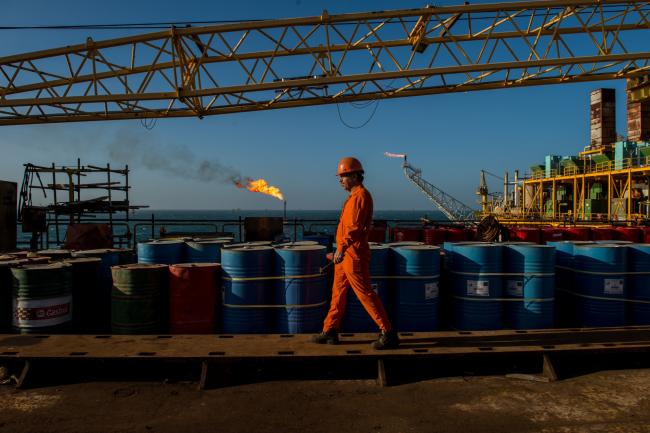(Bloomberg) -- Oil rebounded from the biggest monthly loss in a decade after Russia and Saudi Arabia agreed to extend their deal to manage the oil market into 2019 and Canada’s largest oil producing province ordered an unprecedented output cut.
Brent rose as much as 5.3 percent in London, after prices collapsed more than 20 percent last month. Russian President Vladimir Putin announced the extension after a meeting Saturday on the sidelines of the Group of 20 with Saudi Arabian Crown Prince Mohammed bin Salman, though Moscow and Riyadh have yet to confirm any fresh output cuts. Oil also gained after Alberta ordered curbs of 325,000 barrels a day in an effort to ease a crisis in the nation’s energy industry and after the U.S. and China agreed to pause new tariffs.
Crude collapsed into a bear market last month on fears over a supply glut after America granted waivers to some nations to keep importing Iranian oil. Traders have been watching closely if the Organization of Petroleum Exporting Countries and its partners will curb output at their meeting this week in Vienna to stabilize prices. While OPEC delegates said the leaders have given their political blessing for an agreement, plenty of work is left, including on the size of any potential output cut.
“While we still need to know by how much OPEC will curb its production, Putin’s comment does clear a barrier for OPEC in stabilizing prices as Russia has been ambiguous about its stance,” Ahn Yea Ha, a commodities analyst at Kiwoom Securities Co., said by phone from Seoul. “At the same time, oil’s being supported by easing trade tensions between the U.S. and China as it’s improving investor sentiment for risk assets.”
Brent for February settlement gained as much as $3.14 to $62.60 a barrel on London’s ICE (NYSE:ICE) Futures Europe exchange, and traded at $62.51 at 11:38 a.m. in Seoul. The global benchmark crude was at an $8.64 premium to West Texas Intermediate for the same month. The January contract expired on Friday after declining 1.3 percent.
WTI for January delivery climbed as much as $2.92, or 5.7 percent, to $53.85 a barrel on the New York Mercantile Exchange, the highest intra-day level since Nov. 23. The contract lost 22 percent last month. Total volume traded was almost triple the 100-day average.
See also: Russia’s November Oil Output Declines Ahead of OPEC+ Talks
On Sunday, OPEC’s President and the United Arab Emirates Energy Minister Suhail Al Mazrouei, said he was optimistic OPEC+ will reach an agreement over a cut in production for 2019 when they meet in Vienna. Technical teams are working on the level of the cuts necessary and the reference baseline for the reduction, he said.
“This might be the critical breakthrough for OPEC and non-OPEC to cut,” said Derek Brower, a director at consultant RS Energy Group. “But the details are now what matter -- how much will be cut, from when, for how long and, crucially, from what baselines.”
Saudi Arabia said through its state-owned press agency that Riyadh and Moscow had held talks in Buenos Aires about “rebalancing” the oil market. While both talked about progress and extension of the cooperation, neither the Russians nor Saudis made any formal declaration about output volumes.
Further Boost
Meanwhile, Alberta’s decision to curtail output gave a further boost to prices. The unprecedented step, announced Sunday, will reduce production of raw crude and bitumen by 8.7 percent starting in January until the levels of excess oil in storage are drawn down. The reduction would then drop to 95,000 barrels a day until the end of next year at the latest.
The amount being cut is more than the total production of each of OPEC’s three smallest members: Equatorial Guinea, Gabon and the Republic of Congo.
Donald Trump and his Chinese counterpart Xi Jinping called a truce at a high-stakes meeting on Saturday night in Argentina, with the U.S. president agreeing to postpone a planned tariff hike on Chinese goods for three months in return for greater purchases of American products. The arrangement provides breathing space to both leaders as they face slumping stock markets and economic warning signs.